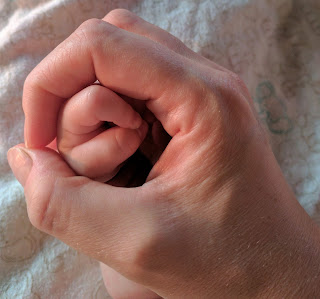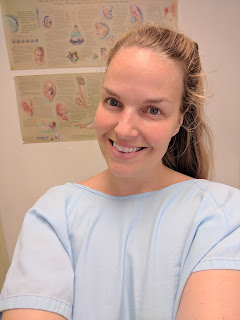 |
| I found myself back in a hospital gown again . . . |
There are a variety of figures, ranging from 17% to 33.3%, of the number of IVF patients who become pregnant naturally with another child postpartum. I had even been warned at the hospital by a couple of nurses and a doctor that they had seen IVF patients achieve pregnancy even before their first postpartum physical. It seemed impossible to me though that I would ever be so lucky as to achieve another natural pregnancy and actually see a baby at the end of it. My first baby took seven years for me to hold in my arms and I still felt demoralized by the whole experience of unexplained infertility, miscarriage, and then having to go through the physically, emotionally, and mentally challenging process of IVF.
But I still didn’t get my period. My husband was away on a business trip and I was too afraid to take a pregnancy test without him. I hoped so much that I was pregnant and would have been crushed if I wasn’t, but was sure that I couldn’t be, so wanted his support in finding out that I wasn’t. At the same time, I started craving oranges like crazy (this is my pregnancy “tell” as last time I was pregnant I ate my way through a tonne of oranges). Things started to smell and taste different. I wasn’t enjoying some foods that I usually enjoyed.
My husband returned and I took the final pregnancy test in a box that we had bought when I was undergoing IVF. It turned positive almost immediately. Then it estimated the number of weeks. We were stunned. Our baby was only a few months old and we didn’t know how we would handle having two such young children, but we were filled with hope. Then fear. What if I wasn’t actually pregnant? What if I miscarried again?
 |
| I could not believe the positive result on the pregnancy test. |
 |
| We took this photo the day we found out we were pregnant. We were so incredibly happy. |
I met my family doctor again and he said that based on the results it looked like a viable pregnancy. I went home and within the hour began to bleed profusely. I was sure I had had a miscarriage again. I was sent to emergency. I was given a blood test and sent home with no answers. I returned to a different emergency department at a different hospital for an ultrasound the next morning. Then I waited for the results in that emergency department for seven hours while a heartless bitch of a nurse told me that I was the lowest priority and they “might” get to seeing me that day, but since I wasn’t an emergency I might not be seen. I sat in the uncomfortable hospital chairs alone as my husband took care of our baby.
The doctor in the emergency department who finally saw me said that the fetus was alive and he had no way of knowing if the pregnancy would continue or not but for now it looked fine. He said I had to see a high risk obstetrician. I was referred back to my family doctor to get a referral.
My family doctor told me I would definitely have to be under the care of a high risk obstetrician because I had two subchorionic hemorrhages in my uterus (and that is where the bleeding came from). He referred me to a high risk obstetrician.
Then I had another bleed four days later.
Then another bleed two days later with more cramping.
I was sent to emergency again, at another hospital (my third). I waited all day to see a doctor, get an ultrasound, and then see a doctor again (about ten hours while my mother watched the baby since my husband was away travelling again). The subchorionic hemorrhages had increased in size but the fetus was alive and my hCG levels were good. The ER doctor tried to refer me to a high risk obstetrician but they told her that they wouldn’t take me and I’d just have to find a regular maternity doctor for now.
I had difficulty finding a maternity doctor taking patients (and one who I saw told me that this interview could all just be “a waste of time” since I had been having bleeding.) My old maternity doctor who was stopping obstetrics took pity on me and took me in.
I had been referred for a follow up ultrasound (the emergency department lost the referral, but then found it and sent it to the ultrasound booking department about a week later, after it was supposed to be done). I had the follow ultrasound about two weeks after my last emergency room ultrasound and the fetus was kicking its little leg buds around with a strong heartbeat. I couldn’t believe it. I cried with joy.
 |
| The fetus was kicking its little leg buds (on the right) during the ultrasound. |
I continued to wear pads fearing bleeding through my pants again as I had three different times in the pregnancy. I had three weeks of no bleeding.
Then it started again. But it wasn’t fresh blood this time, it was old blood. The forums I read talked about people’s subchorionic hemorrhages draining old blood sometimes. Days passed. I saw the doctor and he said it was too early to hear the heartbeat in the office with his doppler. He palpated my uterus. There really wasn’t anything he could do. He said it might be the body shedding old blood or it might be something worse. I would just have to wait and see.
The bleeding increased that night. I went to bed and the cramps that had been uncomfortable became really uncomfortable in the night. In the early morning fresh blood started. The cramps increased more and more.
I called my doctor. His assistant said she would try to get an ultrasound for me as soon possible or I could go wait in emergency again. I declined emergency care as I had already been told if a miscarriage started there is nothing that can be done.
My husband was away again on a business trip and I had to care for my baby alone at home that day while the bleeding increased more and more and now hunks of tissue started to come out. I was horrified and felt physically awful on top of the crushing mental and emotional blow that I was experiencing. Again.
My husband tried to get back earlier but had difficulty getting back much earlier than he was scheduled that night. I yelped as tissue coming out of my uterus hit the toilet water with loud splashes. I couldn’t believe I was going through this. And going through a miscarriage was so much worse at 11.5 weeks pregnant than 6 weeks pregnant. The amount of tissue and blood was so much more. It was harrowing.
The next day, my husband and I asked my sister to care for our baby and we went to the ultrasound at the hospital. I prepared myself for the inevitable. The technician was weird and not helpful like the past few I had had. He didn’t point the screen at all in my direction and there was no second screen, but I didn’t need one to tell me that the baby was dead and long gone. My husband peered at the screen and said he didn’t see anything. They sent in a radiologist who looked at the images and informed me what I already knew, that I had miscarried and that there was no fetus left, only some tissue. My grief was so intense I was almost numb.
My doctor called later that day to discuss the miscarriage. He said if I stated bleeding really, really heavily or seemed to have an infection, go to emergency. And if I bled for more than about two to three weeks then go to emergency. And that was it. I could go in and see him and discuss it more, but what was the point.
I spent the next couple of days cancelling my next ultrasound, cancelling my lab tests, and cancelling my next appointment with my endocrinologist who was only seeing me more frequently because I was pregnant. And I bled and bled and bled.
I sank into the grief like an icy bathtub, my numbness preventing me from even crying most of the time. Then the rage. How could this have happened again? Why had I had to suffer again? Why had this had to distract me from my recovery from my last pregnancy and getting to know my baby? Why had I had to suffer for almost three months with this difficult pregnancy (which had a lot of nauseous, dizziness, and exhaustion) and bleeding off and on for nothing? Why do people who don’t want children get them and without any effort? How could I ever trust my body again? Would I ever be able to give my baby a sibling? How could I ever go through another pregnancy knowing that 66.6% of mine have ended in miscarriage now?
Christmas, a time of the year that I already find very challenging emotionally was further mired by the bleeding, hormones, and despair that I felt from the miscarriage. My only child's first Christmas should have been a time of great joy, but I had trouble focusing on the holiday rather than the heartbreak.
Three and half weeks later I have progressed through to a profound sadness, but those questions still remain unanswered. As my bleeding is just ending now, I still don’t know if I’ll ever have the courage to try to give my baby a sibling again via FET or IVF. I am haunted by the memory of the fetus kicking on the ultrasound (I never got to see the first pregnancy’s fetus because it died at six weeks so this has intensified my grief if that’s possible), knowing that I will never get to hold this baby in my arms. I hold my living baby all the tighter.
 |
| I hold my baby all the tighter. |









































